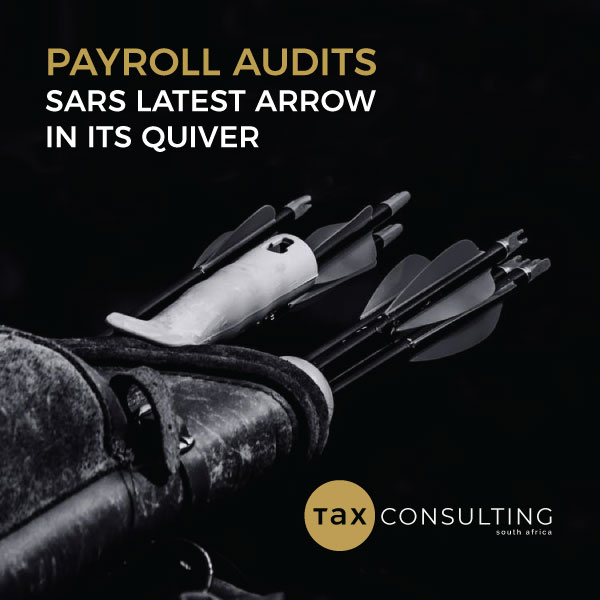SARS PAYROLL AUDIT
LATEST ARROW IN SARS’ QUIVER
In what now seems to have become an annual occurrence, the Minister of Finance, Tito Mboweni, has announced during this year’s budget speech that there will, again, be a tax revenue shortfall – this time to the tune of R43 billion.
Despite promising initiatives implemented by the South African Revenue Service (SARS), it appears that its tribulations in meeting its collection target have not yet waned. With the pressure mounting on SARS to make up the shortfall, it has become more assertive with its collection stratagems and payroll audits seems to be SARS’ latest weapon of choice.
SARS’ Honeypot
The simple reason behind SARS’s targeting of payroll when it needs extra taxes, is purely because of its tendency to contain errors, as well as the potential to collect large sums of tax from a single taxpayer. Mistakes are magnified by the size of the company’s payroll and SARS can, and will, collect any underdeclared taxes from the employer, as opposed to the individual taxpayers themselves.
In the case of a large payroll with many employees, even the smallest errors can leave a company with a large tax exposure, as these errors are proliferated across the employee base. In other instances, inexperienced payroll administrators simply do not know the law, which results in glaring errors such as failing to tax fringe benefits or paying lump sums without getting tax directives.
The truth is that SARS will find something, and most employers only become fully compliant once they have gone through the ordeal of a payroll audit conducted by SARS.
Rising Trend
As if the challenges of a payroll audit are not daunting enough, a new trend has become apparent that makes it increasingly difficult to get a clean bill of health from the SARS audit team. Rather than identifying specific items that were inaccurately treated on payroll, SARS has now turned its gaze to the financial statement aspect of payroll.
These statements are assessed by SARS for an understatement or short payment of employees’ tax purely on the basis that there is a discrepancy between the company’s payroll reconciliation and the cost of employment as reflected in the company’s annual financial statements. This is despite SARS’ awareness that not all amounts reflected in the annual financial statements under cost of employment should be processed to the payroll.
Nevertheless, the onus is placed on companies to dispute this and to explain why the amounts making up the difference is either exempt or not taxable. This is a quarrelsome task, as this effectively equates to finding a needle in a haystack and then proving that it is not subject to tax.
Unblemished payroll
Given the ease with which SARS can collect revenue by targeting payroll taxes, a head-in-the sand approach is ill-advised and will end in calamity. The best defense is to have your payroll audited independently, before SARS decides to do so, to ensure that any issues are addressed.
This will minimise the affliction of any future audits by SARS and any errors detected can be disclosed via SARS’ Voluntary Disclosure Programme.
Otherwise, if SARS comes knocking, you are in for an unpleasant dispute with SARS and penalties that may just exceed the actual taxes payable.
AUTHORS

Mariana Stander
Tax and Expatriate
Remuneration Specialist
![2025-logo-[Recovered] Tax Consulting South Africa](https://www.taxconsulting.co.za/wp-content/uploads/2025/01/2025-logo-Recovered.png)


